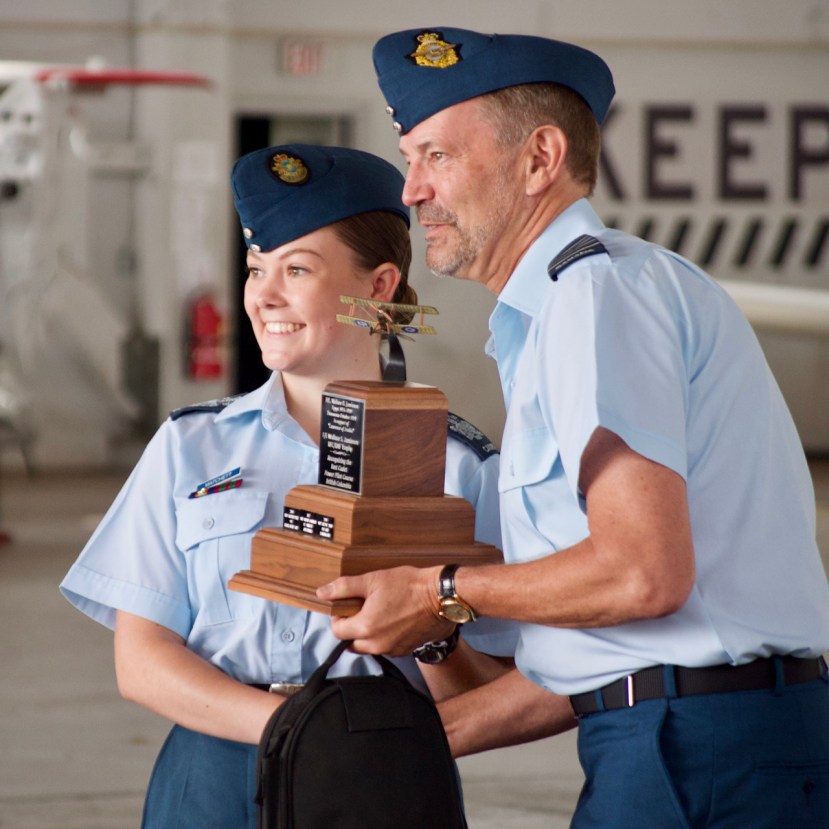
As she graduated from her Air Cadet programme this summer, Christina Matchett was decidedly in the minority. One of only four young women graduating from her class powered flight class 28 strong. She is marching into a field dominated by men.
Just don’t tell her that. Or her mom. Or her grandmother. Three generations of women involved in Canadian aviation.
“It’s a big family, big history in aviation ,” said Matchett, hardly able to contain her infectious grin. “My grandmother was in the Air Force, both of my parents are glider pilots as well as power pilots and my brother and I are glider pilots, and I just recently received my power pilot’s licence, so it’s kinda like a multi-generational family deal.”
With her mother dressed in her Royal Canadian Air Force uniform looking on, Marchett graduated from Air Cadets at a summer ceremony in the Heritage Hangar at Boundary Bay Airport, a half hour south of Vancouver.

“It’s a lot of fun, to be able to represent not only women in aviation, but keeping it going through the generations.” For her test, Matchett was prepared with her parents’ knee board and headset. “They’re definitely a big part of my success.”
That success includes taking home the award presented to the top overall cadet for flying skill, knowledge, airmanship, maturity and self discipline.
Her mother was her first passenger in a glider, Matchett’s brother will be her first passenger in a powered aircraft.
Matchett is planning to attend the University of British Columbia in Vancouver, studying Earth, Ocean and Atmospheric Science. Long term, she hopes to get her commercial licence and pilot for a government agency such as Fisheries and Oceans Canada.
Piloting government planes is just one of the career options open to the young cadets, said honourary colonel Robert Quartermain. He told cadets gathered in the Heritage Hangar at Boundary Bay Airport about his own graduation parade in 1973, but poor eyesight kept him out of the Air Force. Instead, he went on to a 40-year career building multi-billion dollar mining companies.
“Of the 16 Air Cadets that I graduated with,” said Quartermain, “they’ve gone to become airline pilots, a few went into the military, and many like myself had to find another vocation.”
Aviation is still a big part of his career, ferrying him to the gold mine where he is chairman, 1,000 km from Vancouver.
“As an exploration geologist around the world, I’ve used a wide variety of aircraft to get into the different areas that we get into, and often I’ll say ‘I’m a private pilot,’ usually they’ll let me jump in the right seat.”
Quartermain sees plenty of opportunity for the young graduates, especially as airlines grow, and older pilots get set to retire.
One of the cadets hoping to capitalize on the opportunity is Nicholas Lourens, winner of two awards for his flying skills and maturity. Graduation is the culmination of a six-year affiliation with the Air Cadets, and fulfilling a dream he’s had since he was four years old.

“Power is sort of a stepping stone for me, because I want to become a commercial pilot,” said Lourens. A second option would be the Royal Canadian Air Force
Lourens is headed to Mount Royal University in Calgary to continue his aviation studies. “I think the ground is kinda overrated, personally,” he said with a laugh.
“After Mount Royal, I’m not really sure. I’d like to work for maybe float planes. I’ve always found float planes really cool.”

No study has ever been done to track cadets’ long-term career choices. Though some of these teenage boys and girls will choose a career in the armed forces, there is no obligation for them to do so. Nor are they required to continue in aviation.
Even though he won two prizes at this year’s parade, Lourens lamented he only scored 80% on his Transport Canada written test, while others in his cohort recorded marks in the mid-90s, an indication the future of aviation in Canada is in very good hands indeed.
Categories: General aviation

